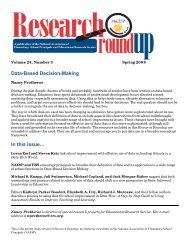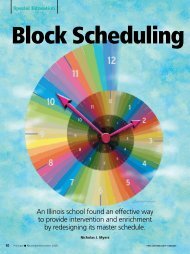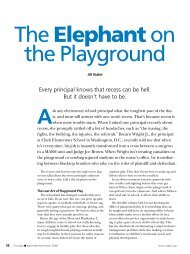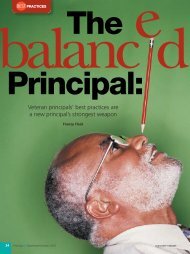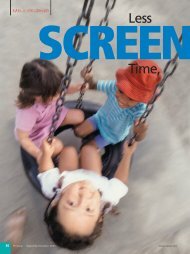Standardized Testing: The Do-or-Die Agenda - National Association ...
Standardized Testing: The Do-or-Die Agenda - National Association ...
Standardized Testing: The Do-or-Die Agenda - National Association ...
Create successful ePaper yourself
Turn your PDF publications into a flip-book with our unique Google optimized e-Paper software.
ASSESSING THE ASSESSMENTS<br />
<strong>Standardized</strong> <strong>Testing</strong>:<br />
THEDO-<br />
AGENDA<br />
<strong>The</strong> tests-and-standards movement<br />
has become a juggernaut that is<br />
overwhelming public education.<br />
Jonathan Kozol<br />
18<br />
Principal ■ March/April 2006<br />
www.naesp.<strong>or</strong>g
R-DIE<br />
Even in good suburban schools where sc<strong>or</strong>es are<br />
generally high, I don’t know many principals and<br />
teachers who believe that the repeated measuring of<br />
children’s skills by standardized exams has had a positive<br />
effect upon the processes of education; I know many m<strong>or</strong>e<br />
who feel it has the opposite result. But, in the districts in<br />
which students as a matter of routine do relatively well,<br />
the tests do not entirely suffocate instruction.<br />
Teachers in the elementary grades<br />
within these districts generally feel they<br />
can allow themselves the luxury of letting<br />
youngsters wander off from time<br />
to time into a subject that holds interest<br />
f<strong>or</strong> them but has no direct, <strong>or</strong> even<br />
indirect, connection with the competencies<br />
to be measured by the state.<br />
It is a different st<strong>or</strong>y in too many<br />
inner-city schools, where deviations<br />
from a charted road set off alarm bells<br />
f<strong>or</strong> the supervis<strong>or</strong>y officials and where<br />
teachers who are not eternally “on<br />
task” are made to understand that they<br />
will bear the burden of responsibility if<br />
the percentile gains demanded, f<strong>or</strong> example,<br />
by one of those school improvement<br />
plans are not attained within the<br />
time prescribed.<br />
<strong>The</strong> Road to Rome<br />
“If the road does not lead to Rome,”<br />
said a woman who was called the “manager”<br />
of language arts f<strong>or</strong> the Chicago<br />
public schools, “we don’t want it followed.”<br />
Rome, she said, was the examination<br />
children would be given at the<br />
end of a specific sequence of instruction<br />
(Hendrie 1997).<br />
Most Americans whose children<br />
IN BRIEF<br />
aren’t in public schools have little<br />
sense of the in<strong>or</strong>dinate auth<strong>or</strong>ity that<br />
Kozol depl<strong>or</strong>es the obsessive use of<br />
high-stakes standardized testing in elementary<br />
schools, particularly those in<br />
po<strong>or</strong> urban districts. He cites examples<br />
of schools where the time devoted to<br />
testing and test preparation has been<br />
taken from subjects that are not tested,<br />
including science, hist<strong>or</strong>y, and the arts,<br />
is now granted to these standardized<br />
exams and, especially within the innercity<br />
schools, the time the tests subtract<br />
from actual instruction. In some<br />
schools, the principals and teachers<br />
tell me that the tests themselves and<br />
preparation f<strong>or</strong> the tests control m<strong>or</strong>e<br />
than a quarter of the year.<br />
www.naesp.<strong>or</strong>g<br />
and decries the trend to testing children<br />
as early as kindergarten.<br />
Principal ■ March/April 2006 19
At P.S. 65 [New Y<strong>or</strong>k City], during<br />
the three months pri<strong>or</strong> to the allimp<strong>or</strong>tant<br />
state exam, fifth-grade<br />
teachers had to set aside all other lessons<br />
from 8:40 to 11 a.m., and from<br />
1:45 to 3 p.m., to drill the children f<strong>or</strong><br />
their tests. In addition to this, two afternoons<br />
a week children in the fourth<br />
and fifth grades had to stay from 3 to<br />
5 p.m. f<strong>or</strong> yet another session of test<br />
preparation. <strong>The</strong> children were told,<br />
said one of the teachers, that “it’s not<br />
just ‘imp<strong>or</strong>tant’ that they pass,” but<br />
that “passing this—the test—is actually<br />
the only thing that is imp<strong>or</strong>tant.”<br />
In some cities, these examinations<br />
start as early as kindergarten <strong>or</strong> first<br />
grade. Four years ago in Santa Paula,<br />
Calif<strong>or</strong>nia, f<strong>or</strong> example, kindergarten<br />
children were required to take standardized<br />
exams beginning in the last<br />
week of September. Two weeks, in all,<br />
were taken up by these exams, which<br />
school officials said they had to give to<br />
qualify f<strong>or</strong> extra funding from the<br />
federal government (Ragland 2001).<br />
“In some schools, the principals<br />
and teachers tell me<br />
that the tests themselves<br />
and preparation f<strong>or</strong> the<br />
tests control m<strong>or</strong>e than<br />
a quarter of the year.”<br />
Front-loading Children<br />
<strong>The</strong>re is a new pedagogic term f<strong>or</strong><br />
introducing children to these testing<br />
practices at a very early age. <strong>The</strong> term,<br />
acc<strong>or</strong>ding to a teacher-educat<strong>or</strong> in<br />
Ohio, is “front-loading children,” a<br />
usage that appears to have <strong>or</strong>iginated<br />
in the w<strong>or</strong>ld of capital investment.<br />
No matter how offensive this may be<br />
to teachers, school officials often feel<br />
they have no choice but to apply these<br />
practices during the first two years of<br />
school. In Alabama, f<strong>or</strong> example,<br />
where kindergarten children are required<br />
to take standardized exams<br />
<strong>The</strong>re are pri<strong>or</strong>ities in life....<br />
Now you can have it all.<br />
Family.<br />
Career.<br />
Education.<br />
100% Online Degrees<br />
Master’s and Ed.D/Ph.D.<br />
Degrees in<br />
EDUCATION<br />
10 Specializations<br />
Monthly Starts<br />
Flexible Term Lengths<br />
Regionally Accredited<br />
1-to-1 Faculty Ment<strong>or</strong>ing<br />
Preferred Partner of SAILf<strong>or</strong>Education.<strong>or</strong>g<br />
and Educational Impact<br />
Contact us at 866-776-0331 <strong>or</strong> Principal.ncu.edu<br />
three times in the academic year, officials<br />
in one district did away with “nap<br />
time” so that teachers would have extra<br />
time to get the students ready f<strong>or</strong> their<br />
tests (Atlanta Journal-Constitution 2003).<br />
<strong>The</strong> usual administrative rationale<br />
f<strong>or</strong> giving tests like these to children in<br />
their elementary years is that the test<br />
results will help to show their teachers<br />
where the children’s weaknesses may<br />
lie, so that they can redirect the focus<br />
of their w<strong>or</strong>k in <strong>or</strong>der to address these<br />
weaknesses. In practice, however, this<br />
is not the way things generally w<strong>or</strong>k,<br />
because of the long lapse in time between<br />
the taking of these tests and the<br />
receipt of sc<strong>or</strong>es.<br />
A Different Kind of Test<br />
<strong>The</strong>re is an entirely different kind of<br />
early testing in which the results are instantly<br />
available to teachers because the<br />
tests are given individually to children,<br />
so that teachers can observe the difficulties<br />
they face and can assess their<br />
strengths and weaknesses during the administration<br />
of the test itself. I recently<br />
watched a teacher giving one such diagnostic<br />
test, known as the ECLAS [Early<br />
Childhood Literacy Assessment System],<br />
to a student in her second grade.<br />
<strong>The</strong> student was relaxed and seemed<br />
to like the private time and personal<br />
attention the teacher gave him. Although<br />
the teacher had to draw on her<br />
ingenuity to keep the rest of the children<br />
occupied with independent w<strong>or</strong>k<br />
while she was doing this, she did not<br />
view it as time stolen from instruction.<br />
<strong>The</strong>re is no “test prep” f<strong>or</strong> these<br />
kinds of genuine assessments. Teachers<br />
would have no reason to drill children<br />
in advance because the purpose of<br />
these tests is not to judge the child <strong>or</strong><br />
the teacher, but to gather inf<strong>or</strong>mation<br />
that is helpful to them both.<br />
This is not the case with high-stakes<br />
standardized examinations, the results<br />
of which supplant and overrule the<br />
judgments of the teacher. “What w<strong>or</strong>ries<br />
me most,” writes Deb<strong>or</strong>ah Meier, “is that<br />
in the name of objectivity and science,”<br />
the heavy reliance upon high-stakes testing<br />
has led teachers “to distrust their<br />
ability to see and observe” the children<br />
20<br />
Principal ■ March/April 2006<br />
www.naesp.<strong>or</strong>g
they are teaching and derive conclusions<br />
based upon their observation.<br />
“We cannot trust such tests,” she<br />
writes, “to determine an individual’s<br />
competence <strong>or</strong> the success of any particular<br />
school, district, <strong>or</strong> state, <strong>or</strong> to<br />
determine the w<strong>or</strong>th of any school ref<strong>or</strong>m<br />
<strong>or</strong> set of school ref<strong>or</strong>ms. We can<br />
win occasional sh<strong>or</strong>t-term public relations<br />
vict<strong>or</strong>ies…by improving testable<br />
skills, but in the end such vict<strong>or</strong>ies will<br />
be at the price of a good education…<br />
And meanwhile we dist<strong>or</strong>t the education<br />
that we offer…”(Meier 2002).<br />
Penalizing Min<strong>or</strong>ities<br />
One of the dist<strong>or</strong>ting consequences<br />
that is taking an especially high toll on<br />
children of min<strong>or</strong>ities, Meier notes, is the<br />
increasing practice of compelling children<br />
to repeat a grade <strong>or</strong> several grades<br />
over the course of years solely on the basis<br />
of their test results and, in some districts,<br />
almost wholly independent of the judgments<br />
of their principals and teachers.<br />
<strong>The</strong>re is another way in which the students<br />
in increasing numbers of our lowperf<strong>or</strong>ming<br />
urban schools are being<br />
penalized by the insistent pressure to<br />
deliver higher sc<strong>or</strong>es on standardized<br />
exams. In many of these schools, traditional<br />
subjects such as hist<strong>or</strong>y, geography,<br />
and science are no longer taught<br />
because they are not tested by highstakes<br />
examinations and cannot contribute<br />
to the sc<strong>or</strong>es by which a school’s<br />
perf<strong>or</strong>mance will be praised <strong>or</strong> faulted.<br />
A principal’s ability to claim that children<br />
in his <strong>or</strong> her school are learning to<br />
play violin <strong>or</strong> to read music, <strong>or</strong> perf<strong>or</strong>ming<br />
in a dance ensemble <strong>or</strong> a ch<strong>or</strong>al<br />
group, will not protect the school from<br />
sanctions and humiliation if its sc<strong>or</strong>es in<br />
math <strong>or</strong> reading do not satisfy the stipulations<br />
of the state. Some principals in<br />
urban schools do what they can to introduce<br />
<strong>or</strong> to preserve arts programs by<br />
securing private grants and by insisting<br />
that some p<strong>or</strong>tion of the school day be<br />
protected from the state’s empirical demands;<br />
but these are largely marginal<br />
activities and nothing like the programs<br />
of rich cultural exposure that are prized<br />
and celebrated in the schools that<br />
serve the children of the privileged.<br />
www.naesp.<strong>or</strong>g Principal ■ March/April 2006 21
Farewell to Recess<br />
<strong>The</strong> banishment of recess from<br />
the n<strong>or</strong>mal school day is perhaps the<br />
ultimate penurious denial. In Atlanta,<br />
recess has been systematically abandoned<br />
to secure m<strong>or</strong>e time f<strong>or</strong> testrelated<br />
programs since the last years of<br />
the 1990s (Ohanian 2002). In 80 percent<br />
of the Chicago schools, recess has<br />
been abolished also (Schudel 2001).<br />
Some of the districts that deny their<br />
children recess also deny the students<br />
they call “Level Ones” <strong>or</strong> “Level Twos”<br />
a good part of their summer holidays.<br />
Summer becomes a time when children<br />
who have not done well on standardized<br />
exams are dragged back into<br />
classrooms where they’re given still<br />
m<strong>or</strong>e drilling in anticipation of a<br />
“retest” in September. <strong>The</strong>se summer<br />
institutes of sweat and drill and tension<br />
and anxiety would not be needed f<strong>or</strong><br />
most of these children if their schools<br />
were not so flagrantly deficient in the<br />
first place.<br />
Thomas Sobol, the f<strong>or</strong>mer state commissioner<br />
of education in New Y<strong>or</strong>k,<br />
who oversaw the early phases of the standards<br />
movement from the last years of<br />
the 1980s to the mid-1990s, told a group<br />
of future teachers in New Y<strong>or</strong>k not long<br />
ago that he was troubled by the unexpected<br />
consequences to which much<br />
of this has led. “Standards,” “testing,”<br />
and “accountability” have come to be<br />
“the current <strong>or</strong>thodoxy,” he observed.<br />
“People say we need these…standards<br />
to remain competitive in a global economy.<br />
<strong>The</strong>y say we have been too lax.<br />
<strong>The</strong>y say that students will rise to meet<br />
the expectations of their elders and<br />
that teachers will w<strong>or</strong>k harder if their<br />
feet are held to the fire. <strong>The</strong>y say we<br />
will ref<strong>or</strong>m our schools by demanding<br />
m<strong>or</strong>e, and holding students and teachers<br />
accountable f<strong>or</strong> the results…”<br />
“F<strong>or</strong> the rec<strong>or</strong>d,” he went on, “I believe<br />
in high standards. But hist<strong>or</strong>y<br />
teaches us that every good idea contains<br />
the seeds of its own heresy and much of<br />
what is going on in the name of standards<br />
and accountability verges on the<br />
heretical…We are giving kids less and<br />
calling it m<strong>or</strong>e [by] limiting what we<br />
teach to what we can easily measure.”<br />
Reflecting on “a stifling unif<strong>or</strong>mity of<br />
practice” that the testing movement has<br />
imposed on many public schools, Sobol<br />
spoke of aspects of a child’s education<br />
that cannot be measured by exams.<br />
“Learning entails play and risk-taking<br />
[but] we don’t have time f<strong>or</strong> these<br />
things anym<strong>or</strong>e.” What we are giving<br />
them now in many places is a “strippeddown<br />
curriculum” and “instruction<br />
devoid of passion and meaning.”<br />
<strong>The</strong> Juggernaut Rolls On<br />
Despite the stirrings of resistance to<br />
these policies, he said, “the juggernaut<br />
rolls on…Few of us expect it to disappear<br />
suddenly, but many of us expect it<br />
to change…Someday the frenzy will be<br />
over. Someday we will come to understand<br />
that we have been eating poisoned<br />
grain” (Sobol 2001).<br />
I disagreed with only two points in his<br />
talk. I thought the tests-and-standards<br />
movement, as it had emerged in the<br />
middle and late 1980s, had been loaded<br />
with a coarse utilitarian toxicity and a<br />
demeaning anti-human view of childhood<br />
right from the start. I also did not<br />
share his faith that our political system<br />
would reject a set of policies that sends<br />
so many thousands of our students to<br />
the streets without high school diplomas.<br />
<strong>The</strong> political system has permitted<br />
millions of po<strong>or</strong> children to be sent into<br />
the streets without diplomas now f<strong>or</strong><br />
many generations—numbers that are<br />
almost certain to increase under the do<strong>or</strong>-die<br />
agenda that has been enf<strong>or</strong>ced by<br />
nonpromotion policies. P<br />
References<br />
Atlanta Journal-Constitution. “Schools Drop<br />
Naptime f<strong>or</strong> <strong>Testing</strong> Preparation.” 3<br />
October 2003.<br />
Hendrie, C. “<strong>Do</strong> <strong>or</strong> <strong>Die</strong>.” Education Week, 6<br />
August 1997: 40-5.<br />
Meier, D. In Schools We Trust. Boston: Beacon<br />
Press, 2002.<br />
Ohanian, S. What Happened to Recess and<br />
Why Are Our Children Struggling in<br />
Kindergarten New Y<strong>or</strong>k: McGraw-Hill,<br />
2002.<br />
Ragland, J. “In Santa Paula, Kindergartners<br />
Put to the Test.” Los Angeles Times,<br />
6 October 2001.<br />
Schudel, M. “No-Fun Zones: Schools Take<br />
a Recess Timeout.” Technos (Winter<br />
2001): 22-3.<br />
Sobol, T. Unpublished lecture. School Law<br />
Institute, Teachers College, Columbia<br />
University, July 10, 2001.<br />
Jonathan Kozol, the award-winning<br />
auth<strong>or</strong> of Death at an Early Age, Savage<br />
Inequalities, and Amazing Grace, has<br />
been w<strong>or</strong>king with children in innercity<br />
schools f<strong>or</strong> m<strong>or</strong>e than 40 years.<br />
This article is excerpted with permission<br />
from his new book, Shame of the Nation:<br />
<strong>The</strong> Rest<strong>or</strong>ation of Apartheid Schooling<br />
in America (Crown 2005). ©2005 by<br />
Jonathan Kozol. All rights reserved.<br />
WEB RESOURCES<br />
<strong>The</strong> Great Lakes Center f<strong>or</strong> Education<br />
Research and Practice provides<br />
summaries of recent published<br />
research related to high-stakes testing,<br />
including “High-Stakes <strong>Testing</strong><br />
and Student Achievement: Problems<br />
f<strong>or</strong> the No Child Left Behind<br />
Act,” by Sharon Nichols, Gene Glass,<br />
and David Berliner.<br />
www.greatlakescenter.<strong>or</strong>g/<br />
testing.htm<br />
“Effects of State <strong>Testing</strong> Programs<br />
on Elementary Schools with<br />
High Concentrations of Student<br />
Poverty—Good News <strong>or</strong> Bad<br />
News” by Tonya Moon, Carolyn<br />
Callahan, and Carol Tomlinson,<br />
published in Current Issues in Education<br />
in 2003, can be retrieved from<br />
the publication’s Web site.<br />
http://cie.asu.edu/volume6/<br />
number8/<br />
A description of New Y<strong>or</strong>k City’s<br />
Early Childhood Literacy Assessment<br />
System (ECLAS-2) and its<br />
four strands is available online.<br />
www.nycenet.edu/daa/ECLAS/<br />
ECLAS_info.html<br />
FairTest, the <strong>National</strong> Center<br />
f<strong>or</strong> Fair & Open <strong>Testing</strong>, an <strong>or</strong>ganization<br />
actively opposed to highstakes<br />
standardized tests, has an<br />
inf<strong>or</strong>mative and constantly updated<br />
Web site.<br />
www.fairtest.<strong>or</strong>g/index.htm<br />
22<br />
Principal ■ March/April 2006<br />
www.naesp.<strong>or</strong>g




